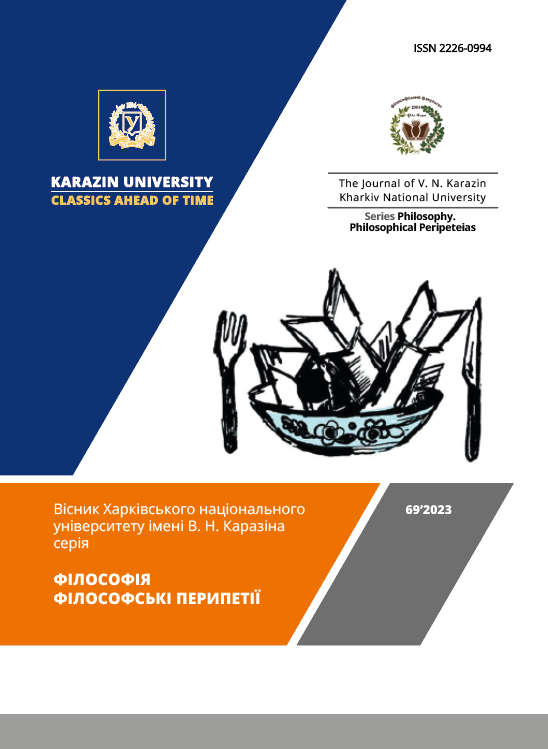WHEN THE HEAVEN OBSCURE (VENTURING INTO THE ONTOLOGY OF «RUSSKIY MIR»)
Abstract
In the endeavor to expound upon the phenomenon of the "russkiy mir", an immediate recognition emerges that the "reality" of this phenomenon can be situated across diverse strata (or within disparate domains) and within the expanse of multifarious exchanges. The attendant representations, delineations, and analyses may be conducted within varying disciplinary frameworks and discourses, encompassing realms as diverse as psychology, psychiatry – both individual and societal, history in its global and regional dimensions, as well as in the quotidian sphere spanning different epochs and methodological paradigms. Cultural studies, social theory, theories of civilizations and ideologies, economics, political economy, and metaeconomics, political and geopolitical studies, natural sciences, humanities, and posthumanism all find their place in classical, non-classical, and post-contemporary models. However, this "reality" is not merely descriptive and analyzable; it also manifests itself, capable of being staged across a spectrum of genres – from quasi-religious ecstasy to the proclamation of the "supreme value," from inebriated effusion to propagandistic performance...
Today there are voices that our modernity identifies itself with the end of philosophy. That the current way of existence of philosophy itself is its rejection and deviation from its vocation, purpose, work and destiny. Herein unfolds a nuanced economy: the "Russian world" can be construed as a symbol of philosophy's proclaimed incapacity or, alternatively, as a peculiar manifestation of philosophy's terminus, an alternative nomenclature for this cessation, a self-negation intrinsic to philosophy's existence. It seems as though the "russkiy mir" is expressly fashioned to attest to, and perhaps more provocatively, effectuate the denouement of philosophy. Furthermore, discerning whether there exists an effect/symptom proves challenging. It appears that in the co-definition of the "Russian world" and philosophy's renunciation of philosophizing – an ontological condition of philosophy's current presence – a kind of "aprioristic perfect" transpires.
Simultaneously, the presence of the "russkiy mir" in the global milieu unveils a nuanced ambivalence toward philosophy. Alongside the factual legitimation of philosophy's incapacity, this presence poses a challenge to philosophical ruminations. It goads philosophizing, insists upon it, and necessitates an interrogation of its presence: "how is this possible, how did this become possible?"
Ergo, the inquiry into the "russkiy mir" is inherently a philosophical one, and we shall endeavor to elucidate as much. However, within this context, an essential question emerges: "What is, what does it signify, and what presupposes the 'philosophical question'?" This inquiry forms the crux of this article.
In this regard, the theme of "culture" enters the discourse, specifically within the modality of "Russian culture." Simultaneously, the question of culture in its entirety becomes pertinent. Examining the theme of the "russkiy mir" as a philosophical query prompts questions regarding "Russian culture" and, ultimately, culture at large.
Downloads
References
Badiou A. (2015). Métaphysique du bonheur réel. Paris: Presses Universitaires de France.
Deleuze G. et Guattari F. (2005). Qu'est-ce que la philosophie? Paris: Les Éditions de Minuit.
Heidegger M. (1967). Sein und Seit. Tübingen: Max Niemeyer Verlag. (Elfte, unveränderte Auflage).
Heidegger M. (2006). Was ist das – die Philosophie? Gesamtausgabe. Bd. 11. Identität und Differenz. Frankfurt am Mаin: Vittorio Klostermann. S. 3-26.
Marret R.R. (1909). The Threshold of religion. London: Methuen & Co. LTD.
Ziizek, S. (2006). The parallax view. Cambridge, Massachusetts, London: The MIT Press.
Zinoviev N. Nikolai Zinoviev – In the steppe, covered with mortal dust... (2015, September). [in Russian]. [videorecording]. URL https://www.youtube.com/watch?v=IoOnb9g_Jf4
Prokopenko V.V. What is the ideology of “russkogo mira”? Volodymir Prokopenko, Discussion Club Sentencia. (2022, September). [in Ukrainian]. [videorecording]. URL https://www.youtube.com/watch?v=RKVfOfmOfkM.
Copyright (c) 2023 Ігор Мінаков

This work is licensed under a Creative Commons Attribution 4.0 International License.
Authors who publish with this journal agree to the following terms:
- Authors retain copyright and grant the journal right of first publication of this work under the terms of a license Creative Commons Attribution License 4.0 International (CC BY 4.0).
- Authors are able to enter into separate, additional contractual arrangements for the non-exclusive distribution of the journal's published version of the work (e.g., post it to an institutional repository or publish it in a book), with an acknowledgement of its initial publication in this journal.
- Authors are permitted and encouraged to post their work online (e.g., in institutional repositories or on their website) prior to and during the submission process, as it can lead to productive exchanges, as well as earlier and greater citation of published work.






3.gif)




